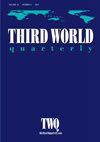在土耳其选举前将军队工具化
IF 1.8
2区 经济学
Q2 DEVELOPMENT STUDIES
引用次数: 0
摘要
摘要本文认为,正义与发展党(AKP)通过在选举前进行军事行动,将土耳其军队工具化。虽然结束军事监护在其他国家被解释为军队专业化的标志,但在土耳其,它却适得其反:文民化的话语和对军事机构的文官霸权导致了军队的工具化。我指出,在选举之前,军事行动的数量大大增加,这有力地表明了工具化的程度。以前的研究主要集中在军队的禁卫军角色上,忽视了军队参与的工具化过程。本文分析了军队的作战方面,介绍了工具化的概念。我认为,土耳其停止军事监护导致了社会和政治的证券化。2016年失败的政变、2015年的两次选举,以及选举期间对国防部门的浓厚兴趣,为检验工具化假说提供了强有力的依据。关键词:军民关系恐怖主义冲突感谢匿名审稿人出色的同行评议过程。我还要感谢人文研究所的大力支持。披露声明作者未报告潜在的利益冲突。作者简介:huseyin Zengin huseyin Zengin目前是匹兹堡大学的客座讲师。他的研究兴趣为政治暴力、军民关系和民主化。他的著作发表在《民主化》、《研究与政治》、《比较国际发展研究》和《地中海政治》。本文章由计算机程序翻译,如有差异,请以英文原文为准。
Instrumentalising the army before elections in Turkey
AbstractThis paper argues that the Justice and Development Party (AKP) has instrumentalised the Turkish army by conducting military operations in the run-up to elections. Although ending military tutelage has been interpreted in other countries as a sign of the professionalisation of the army, in Turkey it has done the opposite: the civilianisation discourse and civilian hegemony over military institutions have led to the instrumentalisation of the army. I demonstrate that the number of military operations significantly increased in the lead-up to elections, which strongly indicates the extent of instrumentalisation. Previous studies have primarily focused on the army’s praetorian role, neglecting the instrumentalisation process in which the military is engaged. This paper analyses the operational aspect of the army and introduces the concept of instrumentalisation. I contend that the cessation of military tutelage in Turkey has resulted in the securitisation of both society and politics. The failed coup in 2016, the double elections of 2015, and the heightened interest in the defence sector during election periods provide strong grounds for examining the instrumentalisation hypothesis.Keywords: Civil–military relationsAKPterrorismconflictelections AcknowledgementsI thank the anonymous reviewers for the excellent peer-review process. I also acknowledge the immense support of the Institute for Humane Studies.Disclosure statementNo potential conflict of interest was reported by the author.Additional informationNotes on contributorsHuseyin ZenginHuseyin Zengin is currently Visiting Lecturer at the University of Pittsburgh. His research interests are political violence, civil–military relations, and democratisation. His work has appeared in Democratization, Research & Politics, Studies in Comparative International Development and Mediterranean Politics.
求助全文
通过发布文献求助,成功后即可免费获取论文全文。
去求助
来源期刊

Third World Quarterly
DEVELOPMENT STUDIES-
CiteScore
4.10
自引率
15.00%
发文量
137
期刊介绍:
Third World Quarterly ( TWQ ) is the leading journal of scholarship and policy in the field of international studies. For almost four decades it has set the agenda of the global debate on development discourses. As the most influential academic journal covering the emerging worlds, TWQ is at the forefront of analysis and commentary on fundamental issues of global concern. TWQ examines all the issues that affect the many Third Worlds and is not averse to publishing provocative and exploratory articles, especially if they have the merit of opening up emerging areas of research that have not been given sufficient attention. TWQ is a peer-reviewed journal that looks beyond strict "development studies", providing an alternative and over-arching reflective analysis of micro-economic and grassroot efforts of development practitioners and planners. It furnishes expert insight into crucial issues before they impinge upon global media attention. TWQ acts as an almanac linking the academic terrains of the various contemporary area studies - African, Asian, Latin American and Middle Eastern - in an interdisciplinary manner with the publication of informative, innovative and investigative articles. Contributions are rigorously assessed by regional experts.
 求助内容:
求助内容: 应助结果提醒方式:
应助结果提醒方式:


